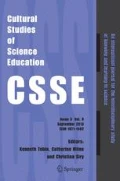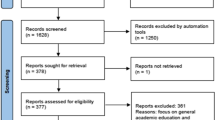Abstract
Research has shown that video games can be good for learning, particularly for STEM topics. However, in order for games to be scalable and sustainable, associated research must move beyond considerations of efficacy towards theories that account for classroom ecologies of students and teachers. This study asks how a digital game called Citizen Science, built using tropes and conventions from modern games, might help learners develop identities as citizen scientists within the domain of lake ecology. We conducted an expert-novice study, revealing that games literacy was a mediating variable for content understanding. In a follow-up classroom implementation, games literacy also operated as a variable, although students drove the activity, which mediated this concern. The teacher devised a number of novel pedagogies, such as a field trip, in response to the unit. We found evidence for the most powerful learning occurring through these activities that were reinforced via the curriculum. Students were most engaged by Citizen Science’s most “gamelike” features, and learners took up the core ideas of the game. Users also reported the experience was short of commercial gaming experiences, suggesting a tension between game cultures for learning and schools.




Similar content being viewed by others
References
Barab, S., Dodge, T., Thomas, M., Jackson, C., & Tuzun, H. (2007). Our designs and the social agendas they carry. Journal of the Learning Sciences, 16, 263–305.
Barab, S., Thomas, M., Dodge, T., Carteaux, R., & Tuzun, H. (2005). Making learning fun: Quest Atlantis, a game without guns. Educational Technology Research and Development, 53, 86–107. doi:10.1007/BF02504859.
Barsalou, L. (1999). Perceptual symbol systems. Behavioral and Brain Sciences, 22, 577–609.
Brown, A., & Campione, J. (1996). Psychological learning theory and the design of innovative learning environments: on procedures, principles, and systems. In L. Schauble & R. Glaser (Eds.), Contributions of instructional innovation to understanding learning (pp. 289–325). Mahwah, NJ: Lawrence Erlbaum.
Card, S., Pirolli, P., Van Der Wege, M., Morrison, J., Reeder, R., Schraedley, P., & Boshart, J. (2001). Information scent as a driver of Web behavior graphs: results of a protocol analysis method for Web usability. In Presented at the presented at the proceedings of the SIGCHI conference on Human factors in computing systems (pp. 498–505), ACM Press.
Cavallari, B., Hedberg, J., & Harper, B. (1992). Adventure games in education: a review. Australian Journal of Educational Technology, 8, 172–184.
Clark, D., Nelson, B., D’Angelo, C., Slack, K., & Martinez-Garza, M. (2009). SURGE: integrating intuitive and formal understandings. Poster presented at the DR-K12 PI Meeting, Washington D.C.
Cole, M. (1996). Cultural psychology: a once and future discipline. Cambridge, MA: Belknap Press of Harvard University Press.
Dede, C., & Ketelhut, D. (2003). Designing for motivation and usability in a museum-based multi-user virtual environment. Presented at the American Education Research Assocation Conference, Chicago, IL, April 21–25.
DeVane, B., & Squire, K. (2008). The meaning of race and violence in grand theft auto: San Andreas. Games and Culture, 3(3–4), 264, 285.
DeVane, B., Durga, S., & Squire, K. (2010). “Economists who think like ecologists”: reframing systems thinking in games for learning. E-Learning and Digital Media, 7, 3–20.
diSessa, A. (2000). Changing minds: computers, learning, and literacy. Cambridge, MA: The MIT Press.
Ericsson, K. A., & Simon, H. A. (1992). Protocol analysis: verbal reports as data. Cambridge, Mass.: MIT Press.
Forbus, K. (1997). Using qualitative physics to create articulate educational software. IEEE Expert, (May/June), 32–41.
Games, A. (2008). Three dialogs: a framework for the analysis and assessment of twenty-first-century literacy practices, and its use in the context of game design within Gamestar Mechanic. E-Learning and Digital Media, 5, 396–417.
Gee, J. (2003). What video games have to teach us about learning and literacy. New York: Palgrave Macmillan.
Gee, J. (2005). Why video games are good for your soul: pleasure and learning. Melbourne Vic.: Common Ground Publishing.
Gibbs, R. (2010). President Obama to announce major expansion of “Educate to Innovate” campaign to improve Science, Technology, Engineering and Math (STEM) Education. Office of the Press Secretary. Retrieved from http://www.whitehouse.gov/the-press-office/2010/09/16/president-obama-announce-major-expansion-educate-innovate-campaign-impro.
Hickey, D., & Schafer, N. J. (2006). Design-based, participation-centered approaches to classroom management. In C. Evertson & C. Weinstein (Eds.), The Handbook of classroom management: research, practice, & contemporary issues (pp. 281–308). New York, NY: Simon & Schuster Macmillan.
Ito, M., Bittanti, M., Boyd, D., Cody, R., Herr, B., Horst, H., Lange, P., et al. (2009). Hanging out, messing around, and geeking out: kids living and learning with new media. Boston: The MIT Press.
Jan, M. (2009). Designing an augmented reality game-based curriculum for argumentation (Doctoral). University of Wisconsin-Madison, Madison, WI.
Ju, E., & Wagner, C. (1997). Personal computer adventure games: their structure, principles, and applicability for training. ACM SIGMIS Database, 28(2), 78–92.
Kuhn, D. (1993). Science as argument: implications for teaching and learning scientific thinking. Science Education, 77, 319–337.
Malone, T. (1981). Toward a theory of intrinsically motivating instruction. Cognitive Science, 5, 333–369.
Mayo, M. J. (2009). Video games: a route to large-scale STEM education. Science, 323(5910), 79–82.
Mead, G. H. (1934). Mind, self, and society. Chicago, IL: University Of Chicago Press.
Messick, S. (1993). Validity. In R. L. Linn (Ed.), Educational measurement (3rd ed., pp. 13–103). New York: MacMillan.
National Research Council (2010). The rise of games and high performance computing for modeling and simulation. Washington D.C.: National Academies Press.
Partington, A. (2010). Game literacy, gaming cultures and media education. English Teaching: Practice and Critique, 9, 73–86.
Saini-Eidukat, B., Schwert, D., & Slator, B. (2002). Geology explorer: virtual geologic mapping and interpretation. Computers & Geosciences, 28, 1167–1176.
Shen, B. J. (1975). Scientific literacy and the public understanding of science. In S. Day (Ed.), Communication of scientific information (pp. 44–52). Basel: Karger.
Squire, K. (2006). From content to context: videogames as designed experience. Educational Researcher, 35(8), 19–29.
Squire, K. (2011). Video games and learning: teaching and participatory culture in the digital age. New York: Teachers College Press.
Squire, K., DeVane, B., & Durga, S. (2008). Designing centers of expertise for academic learning through video games. Theory Into Practice, 47, 240–251.
Squire, K., MaKinster, J., Barnett, M., & Barab, S. (2003). Designed curriculum and local culture: acknowledging the primacy of classroom culture. Science Education, 87, 468–489.
Stake, R. (1995). The art of case research. Thousand Oaks, CA: Sage Publications.
Steinkuehler, C., & Duncan, S. (2008). Scientific habits of mind in virtual worlds. Journal of Science Education and Technology, 17, 530–543. doi:10.1007/s10956-008-9120-8.
Steinkuehler, C., Squire, K., & Barab, S. (2011). Games, learning, and society. Cambridge, MA: Cambridge University Press.
Van Eck, R. (2006). Digital game-based learning: it’s not just the digital natives who are restless. Educause Review, 41(2), 16–30.
Author information
Authors and Affiliations
Corresponding author
Additional information
Lead Editor: C. Milne
Rights and permissions
About this article
Cite this article
Gaydos, M.J., Squire, K.D. Role playing games for scientific citizenship. Cult Stud of Sci Educ 7, 821–844 (2012). https://doi.org/10.1007/s11422-012-9414-2
Received:
Accepted:
Published:
Issue Date:
DOI: https://doi.org/10.1007/s11422-012-9414-2




